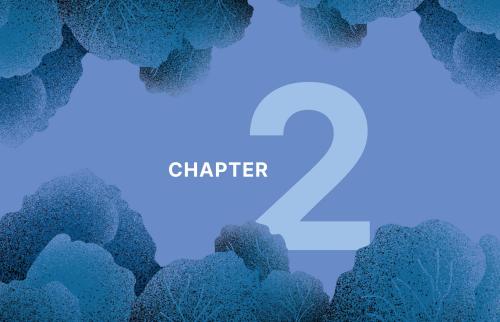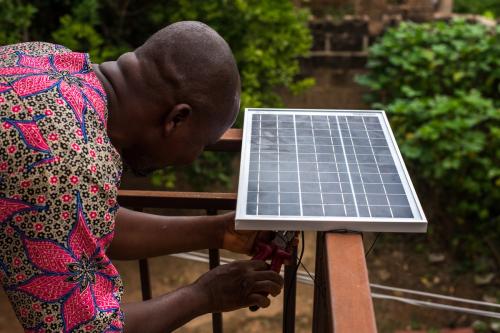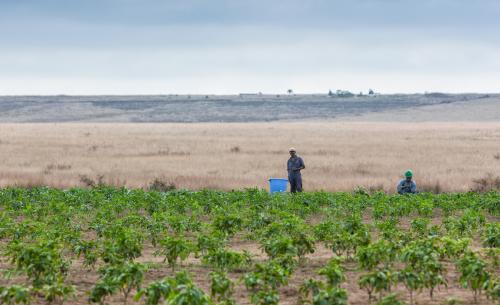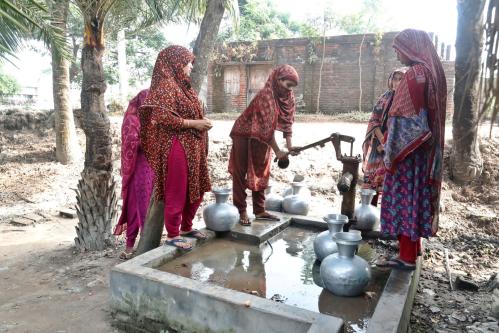This viewpoint is part of Foresight Africa 2024.
Africa is uniquely positioned to tackle climate change while improving livelihoods and protecting biodiversity. For one, its abundance of cost-effective clean energy allows for the “prioritizing [of] energy-intense industries to trigger a virtuous circle of renewable energy deployment and economic activity [including] shifting the primary processing of Africa’s raw material exports to the continent.”1 Transforming energy generation and usage patterns on the continent will reduce emissions, transform health outcomes, improve energy access, and create better livelihoods.
Launched at COP27, the Africa Carbon Markets Initiative (ACMI) was formed to help shape and harness the potential of carbon markets in Africa. We have an objective to drive a dramatic increase in the production of African carbon credits while ensuring that carbon credit revenues are transparent, equitable, and create good jobs.
Credit projects can create jobs, increase climate resilience, and build capacity in the local communities and within emerging economies. Done right, carbon credits present a fresh economic opportunity and offer an important tool for working towards the USD 250 billion fresh investment needed in Africa’s natural environment and agriculture by 2030 to align with the Paris Agreement. Reinforcing the importance of integrity in the carbon market proposition in Africa is central to the mission of ACMI, as without integrity, the increasing demand for credits will pass Africa by.
Transforming energy generation and usage patterns on the continent will reduce emissions, transform health outcomes, improve energy access, and create better livelihoods.
A core part of ACMI’s support entails working with governments to help them operationalize a conducive environment to, among other priorities, drive private sector investment into carbon projects—whether in clean cooking, reforestation, conservation, distributed renewable energy, or engineered removals. ACMI is actively working with a number of countries including Kenya, Mozambique, Rwanda, Malawi, Ghana, and Nigeria to deliver this support. These are the first movers in a pipeline of a total of 20 countries that have sought the assistance of ACMI.
Carbon credits must, however, inspire the confidence of all participants in this marketplace as a key tool in reducing emissions and financing removals. Buyers have to be able to trust what they’re buying while using credits in a way that drive genuine emissions reductions. There have been a number of critiques in the media regarding these topics. At ACMI, we believe only through an increased focus on integrity and transparency will this market scale and benefit communities on the ground. ACMI is working in close partnership with both the Integrity Council for Voluntary Carbon Markets (ICVCM) and the Voluntary Carbon Markets Integrity Initiative (VCMI) to promote end-to-end integrity. The ACMI Showcase is subject to a clear set of integrity principles to underpin supplier inclusion, including compulsory verification using standards recognized by the International Carbon Reduction and Offset Alliance that are also compliant with ICVCM’s Core Carbon Principles. These integrity principles also extend to covering any intermediaries and buyers ACMI engages with. Training programs for carbon project auditors on the continent will also be run, helping develop expertise that’s appropriate and effective in African contexts, supporting a high-integrity supply.
In complement, ACMI is working with different financial sector players to create de-risking solutions to bring early-stage investments into carbon projects. It is only through increases in early-stage investment that the current environment of a multiplicity of single small-project players will be surpassed.
ACMI continues to work with partners to create new methodologies; to scale local capacity to verify, measure, and validate projects; and to build capacities of indigenous peoples and local communities to transparently leverage and benefit from carbon finance. This capacity building and empowerment are intended to improve efficiency, promote integrity, and unlock revenue as Africa delivers on its full potential to meaningfully contribute to solving the climate crisis.
-
Footnotes
- African Union. 2023. The African Leaders Nairobi Declaration on Climate Change and Call to Action.






Commentary
Scaling impact and opportunities in Africa through the leverage of carbon markets
July 26, 2024